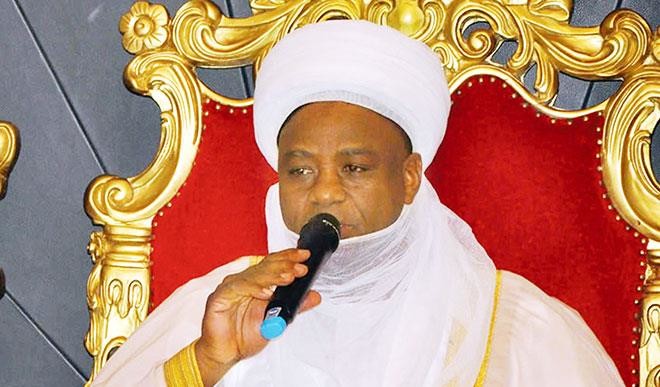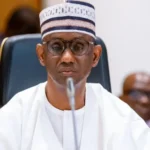During the 4th Quarterly meeting of the Nigeria Inter-Religious Council in the Federal Capital City, Abuja, the Sultan of Sokoto, Alhaji Sa’ad Abubakar, warned that the security situation in the North has gotten out of hand and bandits have overran the region.
He further said it’s outrageous that in many parts of the North bandits walk around openly carrying AK-47 rifles without being challenged by any security agent. Sultan Abubakar lamented that most of the atrocities in the North are not reported in the news. He bemoaned a situation in which 76 people were killed in a Sokoto community in one day and yet it wasn’t news. The reason for this is because murders and killings have become far too numerous and regular in the North to be newsworthy anymore.
- Insecurity: North worst place to live in Nigeria, Sultan cries out
- Boko Haram ‘slaughters’ 43 rice farmers in Borno
In bygone days, outrages were few and far between so they stole headlines and drew both the attention and the ire of most Nigerians. These days mass killings have become commonplace and complaining about the high level of insecurity in the northern parts of Nigeria increasingly appears to be a fruitless exercise. It’s become self-evident that the federal government has an extremely limited understanding of the crisis and how to cope with it. The best that can be said about their response to ever increasing insecurity in the North is that it has been lackluster and unimaginative.
As the Sultan correctly pointed out, the North has now become the worst place to live in Nigeria, and indigenes are fleeing in droves to relocate either to substandard Internally Displaced Persons (IDP) camps littered around the nation, or to southern cities to become beggars. One of the fallouts of this migration is that agent provocateurs are erroneously classifying it as the prelude to some sort of jihadist attack on the South, rather than accept it as quite simply a case of innocent citizens fleeing their ancestral lands and relocating in fear for their lives.
This is so sad. One of the main reasons President Buhari was voted into office was that Nigerians had grown weary of reports about their northern brothers suffering regular wholesale slaughter. Many Nigerians falsely believed that former President Jonathan didn’t show enough concern about the almost routine atrocities occurring there, and perhaps couldn’t care less because he wasn’t a northerner. Others felt that because he had no military experience he embarked upon ill-conceived campaigns which were characterised by squandermania and looting of military funds rather than successes against the enemy.
Back in 2015 the electorate felt that candidate Buhari being a retired general and coming from the North would solve the problem quickly and with military dispatch. How wrong they were! Rather than appoint himself Minister for Defence or Internal Security where he has expertise, President Buhari made himself Minister for Petroleum! The Service Chiefs whom he relied on to handle the situation have not performed creditably, yet for reasons best known to himself he has refused to change them despite their lackluster performance. There is no denying that the current service chiefs appear bereft of new ideas or approaches to overcome their inability to win the war against insecurity. The poor results are hardly surprising. This of course doesn’t take into consideration the sheer number of brave and patriotic Nigerian troops who due to poor logistics, poor intelligence, and the shortcomings of their commanders routinely lose their lives fighting against a rag-tag militia. Frankly there are so many retired military officers in the top tiers of government that it is shameful the way and manner in which troops are treated. The irony of the situation is that while the President neither expresses sorrow, nor appears to be overly concerned, Nigerians recall how he berated President Jonathan in 2014 demanding his resignation because of a security situation which was much better back then than it is today! Although Nigeria supposedly operates a democracy there is little doubt that in the North the legitimate government is at the mercy of unelected illegitimate bandits and ‘jihadists’. As a result, there is worldwide consensus that the Nigerian government is sitting on a powder-keg waiting to explode if urgent action to restore order is not taken. State governors are now reduced to begging bandits to keep the peace, paying kidnappers and rewarding “repentant” terrorists for their nefarious activities. There is absolutely no justification for the lavish treatment given to so-called “repentant Boko Haram” members, compared to the shabby treatment given to their victims languishing in IDP camps.
It has been correctly asserted that banditry in the northern region is a result of decades of bad governance, corruption, injustice, religious fanaticism and the sheer inequality of life. The level of poverty in the region is scandalous for an oil producing nation which refers to itself as “the giant of Africa” and is replete with various minerals, good agricultural lands, and access to the sea. Despite these natural endowments, national security is a prerequisite for economic growth and development of a nation.
Security is the pillar upon which meaningful development can take place. Peaceful nations attract foreign investors, nations where bombing, carnage, kidnapping etc are frequent cannot reasonably expect to entice foreign investment and are left to source for loans. The social, economic and political factors encouraging and indeed facilitating banditry and revolt in the North have been correctly identified but not sensibly tackled. It is generally agreed that unemployment, bad governance, lack of quality education, inadequate basic infrastructure, corruption, perceived victimisation, arrant poverty in the midst of affluence, ethnic superiority, and exploitation are the causes of banditry.
In fairness Nigeria is not the only country suffering from security problems, but this is little consolation to those whose lives are affected. The Sultan also concluded that there is a need for moral and religious education to curb insecurity. There is a need to inculcate respect for human life, honesty, truthfulness, unselfish behaviour, respect for elders, and respect for constituted authority. All said and done Nigerians in general and northerners in particular should be grateful to the Sultan. Many Nigerian traditional rulers are too busy marrying wives and living the good life to be concerned about the welfare of their people. The fact is that if anyone other than Sultan of Sokoto Sa’ad Abubakar had made these comments our President’s loquacious spokespersons would have rained insults upon him and labelled him “unpatriotic”! but his laments cannot be ignored.

 Join Daily Trust WhatsApp Community For Quick Access To News and Happenings Around You.
Join Daily Trust WhatsApp Community For Quick Access To News and Happenings Around You.


